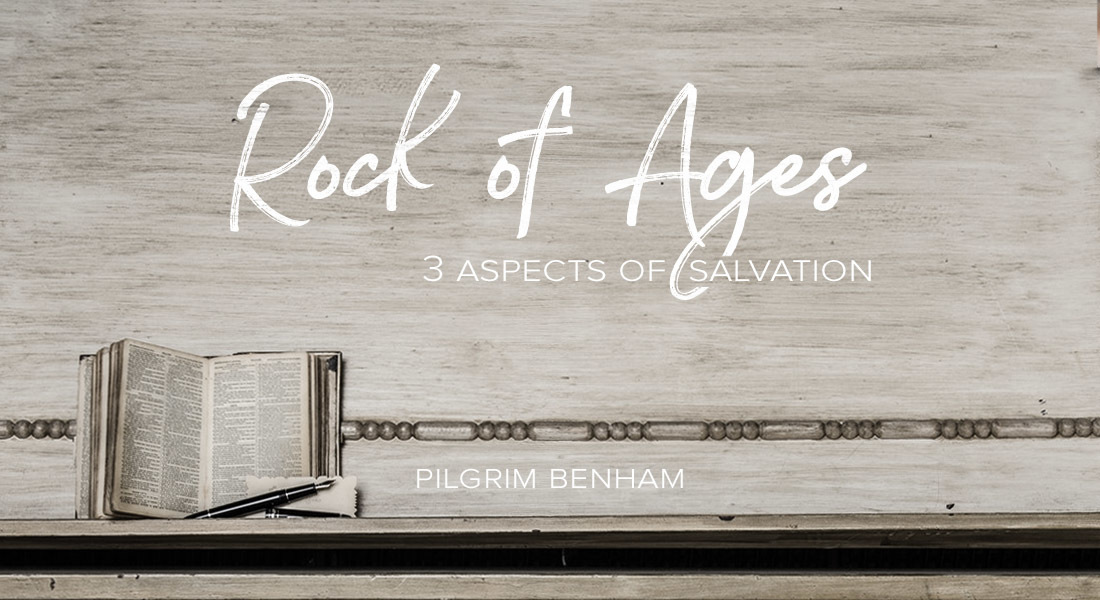
Nothing in my hand I bring,
simply to the cross I cling;
naked, come to thee for dress;
helpless, look to thee for grace;
foul, I to the fountain fly;
wash me, Savior, or I die.
It was a stormy night in Somerset, England, in 1763. A large thunderstorm had quickly moved in, and Augustus Toplady, a preacher in the village of Blagdon, found himself exposed in the brutal elements of wind, rain and lightning. Noticing the nearby gorge of Burrington Combe in the Mendip Hills, he quickly found a small gap in the gorge and took shelter from the violent deluge.
While huddled in the small cove, Toplady was suddenly inspired with words. Scrambling to write them down, he found that he had no paper to write on except a playing card. He quickly scribbled these words:
Rock of Ages, cleft for me
Let me hide myself in Thee
These words later comprised a hymn, known as “Rock of Ages.” Within a generation, this hymn became known as one of the four greatest Anglican hymns of the 19th Century, sung by millions around the world, including at the deathbed of Prince Albert. It is claimed to be in more hymnals than any other English hymn! The lyrics later state:
Not the labors of my hands
can fulfill thy law’s commands;
could my zeal no respite know,
could my tears forever flow,
all for sin could not atone;
thou must save, and thou alone.
Toplady was saved that fateful night from the storm because of the shelter provided by the rocky cleft. You and I, in like manner, have been saved by Jesus Christ from the despair and destruction of sin and death. 1 Peter 1:2 speaks of three unique aspects of our salvation:
“…Elect according to the foreknowledge of God the Father, in sanctification of the Spirit, for obedience and sprinkling of the blood of Jesus Christ: Grace to you and peace be multiplied.” (1 Peter 1:2).
1. CHOSEN: “elect according to the foreknowledge of God the Father”
First, Peter says that we have been elected according to the foreknowledge of God the Father. The word “elect” is the Greek word eklektois (ἐκλεκτοις), which is a plural adjective from the verb eklego (ἐκλεγο) which means “to pick out” or “to select out of a number.” The verb is used in Ephesians 1:4 where it is rendered “chosen,” referring to the act of God in sovereign grace choosing out certain from among mankind for Himself, the verb in Ephesians being in middle voice, meaning the subject acts in his own interest. Quite literally, those to whom Peter is writing could be called “selected out ones.”
Election is tied to foreknowledge. This may seem difficult to understand with our finite minds, but God knows the end from the beginning. James the Apostle points this out in Acts 15:18: “Known to God from eternity are all His works.” Consider this truth: God is omniscient, which means “all-knowing.” God has always been omniscient, which thus means He cannot learn. He knows all things, thus there is nothing new for God to learn. So all His works were known to Him before a single one of them came to be.
I used to love Legos. Okay who am I kidding…I still love Legos! Legoland is only a few hours away from my house, and to be honest, I would probably go to Legoland even if I didn’t have kids (most people know Legos from their reputation in the middle of the night as parents go to check on their kids and step on one with bare feet!)
When I was growing up, I would get a Lego castle set. It came with a bag of bricks, and I would begin to organize each brick based on its size and shape, start reading the detailed IKEA-like instructions; and then I would begin selecting certain blocks to fit together.
One time it was dinner right when I opened my Lego box. I had dumped all the blocks out, and I had to leave it there and go to the dinner table. I remember coming back to the blocks after dinner once I had finished dish duty that night and my sister and brother had gone through my room and dumped all my normal blocks in with the new blocks. I was so mad! It’s funny to look back now, but I was so stressed out at the time, I thought I was going to have a small 12-year-old heart attack. I could hear the doctor saying, “Yeah we’ve never seen such a young boy have a heart attack of this magnitude…what happened…did one of his siblings mix up his Lego blocks?”
I had to slowly and methodically build the castle and look into this pile of mixed up blocks as I was hand selecting…or you could say… “electing” the blocks that were needed for this project. This selective process doesn’t make Lego unfair as a company or uncaring to the other blocks – it simply means that the Designer of the castle had a plan in mind from the beginning. The end result would mean some blocks would be chosen, and others would not.
Foreknowledge means that God knew us from the beginning. It isn’t solely based on knowing and electing us because He knew we would turn in faith to Christ, but that is certainly an aspect of it. What a wonderful truth! The Lord knew me and elected me before the foundation of the world! God foreknew and elected you to eternal life. Glorious!
2. CONSECRATED: “in sanctification of the Spirit”
The second aspect of our salvation is that we are sanctified or set apart: consecrated by the Holy Spirit. This concept is linked to the word “obedience,” meaning that when we first obeyed by placing our faith in Jesus, at that moment we were sealed and sanctified. We were made holy, forensically and legally put in the category of NOT GUILTY.
The Spirit of God has sanctified us, set us apart, consecrated us. Though we are already saved, past tense, we are “being saved” present tense (2 Corinthians 2:15; Philippians 2:12-13). This is the process of growing more and more like Jesus that begins with conversion and then continues endlessly until we see Him face to face in glory.
3. CLEANSED: “sprinkling of the blood of Jesus Christ”
The third aspect of our salvation is the cleansing, atoning work of Christ on our behalf. Peter uses the phraseology and typology of the Levitical ritual where the priest sprinkled the people with the sacrificial blood. The writer of Hebrews picks up on this in chapter nine of his letter and speaks of the shedding of blood on our behalf.
Did you catch the Godhead’s work in salvation in these verses? Notice that each member of the Trinity has a work in our salvation:
. The Father knows us in advance and thus calls us the “elect”
. The Spirit sanctifies us (makes us holy, consecrated to God)
. The Son, Jesus, cleanses us from sin through His atoning sacrifice, made effectual to us by faith.
Vincent says “The Father foreknowing, the Son atoning, the Spirit applying the Son’s work in sanctifying.”
I like what one person said about these three aspects of our salvation:
“We have therefore the three steps taken by the three Persons of the Triune God. God the Father chooses the sinner to salvation. God the Spirit brings the sinner thus chosen to the act of faith. God the Son cleanses him in His precious blood. Perhaps someone may read these lines who is not saved. Your question is, “How can I know whether I am one of those whom God has chosen?” The answer is simple. Put your faith in the Lord Jesus as your personal Saviour, the One who died on the Cross in your stead to make atonement for your sins, and God will save you. You will find that God the Father chose you for salvation, God the Spirit brought you to the act of faith, and God the Son cleansed you from your sin.”
Are you saved? Chosen, consecrated and cleansed? Those who receive Christ as their Savior are protected like Toplady from the wind and lightning. No one else can save from the torrents of sin and death. Only Jesus can be your true Shelter. Will you receive Him today?
If you are saved, what a wonderful reminder for us today: We are chosen! We have been elected to spread the Gospel to the ends of the earth. We are consecrated: set apart to obey God and mature in Him. We are cleansed: washed white and clean because of the Word spoken to us. Let’s trust our Trinitarian God in our salvation so that:
While I draw this fleeting breath,
when mine eyes shall close in death,
when I soar to worlds unknown,
see thee on thy judgment throne,
Rock of Ages, cleft for me,
let me hide myself in thee.






